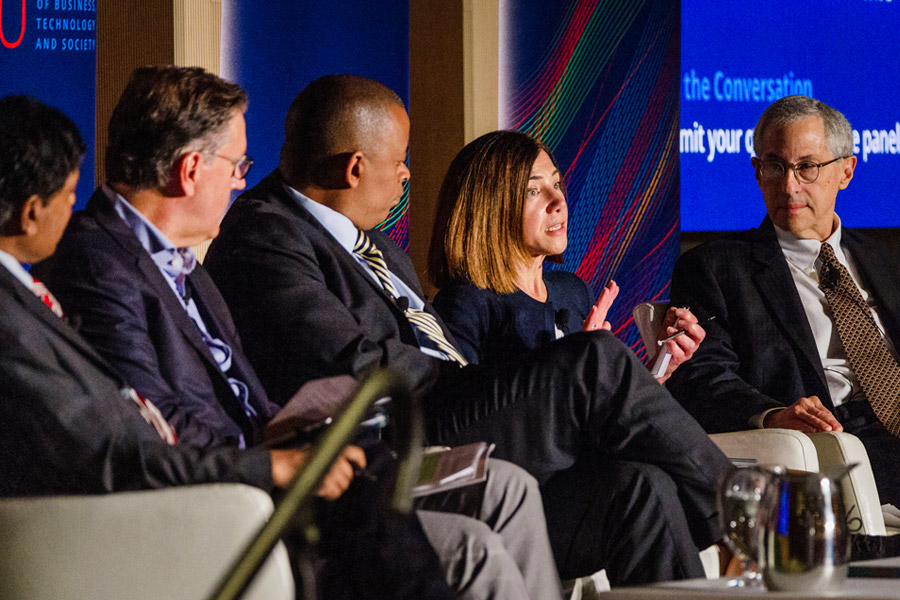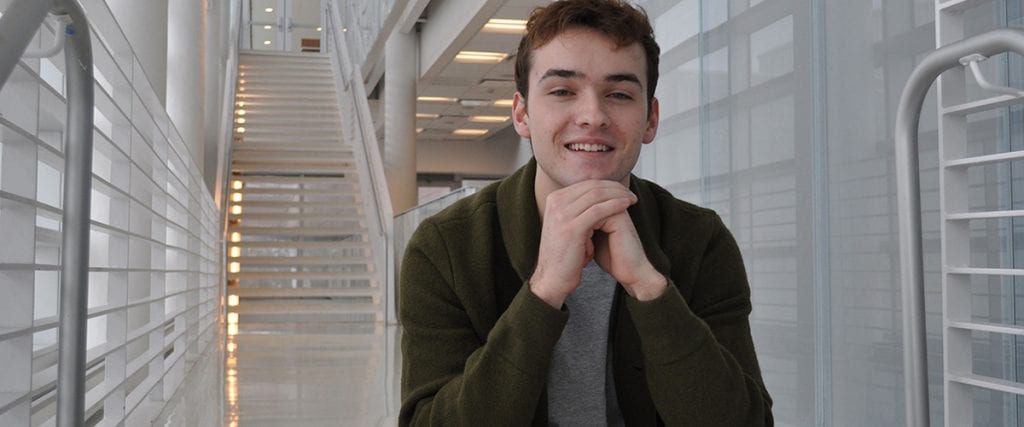News Roundup: New Boston University Online MBA, and More

Let’s take a look at some of the biggest stories from this week, including the new Boston University Online MBA at the Questrom School of Business.
Questrom to Offer Online MBA With edX in 2020 – BU Today
Boston University’s Questrom School of Business will partner with online education platform edX to establish an Online MBA, set to begin in 2020.
On news of the announcement, Boston University President Robert A. Brown says, “With the online MBA, we’re seizing the initiative to offer a major degree for which we believe there is global demand. Higher education must evolve in a fast-changing world. We aim to lead in this evolution.”
Applications officially open on August 16, 2019 and tuition will be $24,000 per year. edX was designed from researchers at Harvard University and MIT in 2012. Since its launch, it has gained more than 21 million users from every country across the world. Chrysanthos Dellarocas, Associate Provost for Digital Learning & Innovation, says, “Through this degree, BU opens itself to the world in a manner we haven’t done before.”
edX started offering Master’s programs last fall, including a master’s in analytics from the Georgia Institute of Technology and a master’s in computer science fro the University of Texas at Austin.
You can read here for more on the online MBA and on edX.
Should Investing be Left to Machines? – UC Davis Graduate School of Management News
Professor and economist Brad Barber of UC Davis Graduate School of Management recently weighed in on the question of the effect of human error in investments. Comprehending biases, he suggests, is the key to improving decisions.
Behavioral biases cost investors 4 percent per year, according to Barber. In a recent article in financial news publication Raconteur, Barber’s research was cited as was that of his colleagues. On the topic of bias and error in investing,
Barber’s colleague Craig Burgess says:
“We are pattern-seeking primates, which is useful for hunting prey, but terrible for complex tasks such as investing. So, we are now regularly prone to hundreds of biases, too deeply ingrained to overcome without removing the human from the process.”
‘Passive investments,’ or those completed via carefully designed software processes, are cheaper than investments performed by a fund manager, and absent of the inherent biases of humans. Many managers, however, argue that skilled ‘active investors’ can beat the effect of bias and error to greater effect than machine learning. For more on Barber’s research, read his profile. For the full Raconteur article, read here.
Save the Date for INTERSECT@CMU: Health Care Innovation – Tepper School of Business Events & Conferences
This year’s INTERSECT@CMU Health Care Innovation Conference will take place on September 13, 2019 at the Tepper School of Business. Registration opens in August.
Among the topics covered by this year’s speakers and panelists will be delivery methods, policy, and emerging technology. Last year’s INTERSECT conference was part of a two-day celebration to commemorate the opening of Tepper Quad. It was also the conference’s inaugural year.

From INTERSECT@CMU 2018 / Photo via cmu.edu/tepper
Opening remarks last year were offered by CMU President Farnam Jahanian and Tepper School Dean Bob Dammon. Jerome Presenti, VP of AI at Facebook, Inc. delivered a keynote speech. Panels covered the growth of smart machines in everyday life, along with the potential of blockchain to revolutionize economies.
To stay posted on this year’s speakers and panelists, visit the INTERSECT@CMU 2019 site.
Million-Dollar Gift for Veterans – USC Marshall News
The USC Marshall School of Business recently announced a $1 million gift from Andrew Tavakoli, MSBA ’86, which will lend support to the Master of Business for Veterans (MBV) program.
The gift will establish the Andrew Tavakoli Family Endowment for MBV Students, which will enable veterans who show exemplary leadership skills and academic performance to advance at USC Marshall. The MBV is a one year graduate program for veterans, active duty, and reserve personnel. It was created to allow vets and those currently serving to apply their military leadership and strategic skills in business settings.
“My hope is that no qualified veteran or active duty personnel would ever be prevented from joining the USC MBV program for lack of financial resources,” Tavakoli says of the gift. He is a member of Marshall’s Board of Leaders and the Los Angeles World Affairs Council. Along with a MSBA from Marshall, Tavakoli holds a BSEE degree in computer science from the University of Pittsburgh and an MBA from California State University Long Beach.
MBV Program Director James Bogle says:
“I truly appreciate Mr. Tavakoli’s support for our veteran students in the MBV program. In our conversations, it quickly became clear that Andrew recognizes the unique potential that former military leaders bring to the business community. “
Read here for more on the MBV and on Andrew Tavakoli.
5 Tips for Making a Meaningful Connection with Employers – Fox School of Business News
Janis Moore Campbell, Director of Graduate Professional Development for the Temple University Fox School of Business‘ Center for Student Professional Development (CSPD) recently offered some helpful hints on how to rise to the top of the applicant pool during your job search.
According to Campbell, the “experience of you that you promise” to an employer is just as vital as your GMAT scores or strong academic record when designing your resume. Most employers want to know what it’s like to work with you, just as much as how well you will perform on any given project.

Work compatability is an under-discussed but important factor when it comes to employment, according to Fox’s Janis Moore Campbell.
Campbell outlines the following guidelines in honing in on your brand.
- Take a realistic look at your presence on the Internet.
- What have others said or posted about you? How well do you come across in light of your future bosses?
- Use facts, not opinions.
- Recommend, as opposed to asking to be recommended – Strengthen your network by reminding others of your presence. One sure way to get others to remember you is by mentioning their accomplishments.
- Strategically volunteer in a capacity that is similar to your career goals.
- Participate in trade associations
- Attend events and publish articles in your areas of interest and expertise.
- Join a network through trade associations
For more on the CSPD and for links to their social media sites, click here.
Rutgers Students Spark Social Entrepreneurship, and More – New York News

Let’s explore some of the most interesting stories that have emerged from New York business schools this week, including Rutgers students jumping into social entrepreneurship.
Artificial Intelligence Gets Real – Stevens Institute of Technology School of Business Blog
Artificial Intelligence is now a $20 billion global industry and investment in AI is projected to triple in the next three years. AI is gradually reshaping many aspects of our daily lives right now. For instance, Apple’s Siri and Amazon’s Echo use AI-type processes, along with Google Maps and Translate. Notably, AI has become integrated into our transportation and medical systems, from self-driving buses, to diagnosing X-rays, AI has shown itself to be highly reliable for many processes.
Electrical and computer engineering professor K.P. “Suba” Subbalakshmi and founding director of SIAI (the Stevens Institute for Artificial Intelligence), asserts, “Simply put, our vision is to drive AI research and application that solves some of those tough ‘big’ problems that have so far resisted solving.”
AI will profoundly reshape society as we know it, but Subbalakshmi reassures the public,”It will permeate everything that we are doing, that’s a fact. But how it’s going to permeate sensibly and how that will affect our lives is in our hands, not the machines’.”
You can read more from the recent Stevens blog entry here.
Enactus Competition Sparks Student Interest in Social Entrepreneurship – Rutgers Business School News
Enactus is a group at Rutgers Business School that fosters social entrepreneurship as a way for students to empower their communities. Ben Foresti, a member of Enactus, worked with the chapter’s executive board to organize a social case competition that inspired a group of Rutgers students to create a unique high school-based incubator program to address food insecurity in New Brunswick.

“We thought a case competition would be a good way to introduce the wider public of Rutgers to social entrepreneurship,” Foresti says.
Foresti shares how he become involved in Enactus:
“While I was exploring clubs to join, I thought I wanted something that would give me good professional development and I was also looking to do something volunteer related. Enactus seemed like a good intersection of the two concepts. It offers professional development and there’s also the focus on improving your community in a sustainable way. It struck me as a perfect organization.”
Foresti reflects on his motivations for holding a social case competition. “We thought a case competition would be a good way to introduce the wider public of Rutgers to social entrepreneurship.”
You can find out more about the article here.
The Evolution of Wine Futures Pricing Research – Whitman School of Management News
Recently, professor Burak Kazaz of Syracuse University’s Martin J. Whitman School of Management delivered a talk late last year, offering faculty and Ph.D. students a closer look into his research on wine futures pricing. Kazaz’s research collected a range of data from New York to the Bordeaux region of France in order to to build a mathematical model that would predict wine futures prices.
During his talk, Kazaz provided an overview of the wine supply chain, which begins with the winemakers. He notes:
“It is important to note these wine markets do not sell only physical bottles of wine. They also sell wine futures. ‘En primeur,’ or wine futures, is a purchase method that allows distributors to purchase wine while it is still in the barrel before it is bottled.”
Kazaz’s predictive model has shown astonishing accuracy, with an average error rate of only 10 percent. Neil Taylor, vice president at Live-ex wrote to the team lauded Kazaz, “Your predictive model is certainly the most accurate I have seen of all of the work we have either done ourselves or participated with.”
Check out more from the recent article here.
Ontario Business Concerns, Leadership, and the Economics of AI – Toronto News

Toronto‘s finest business schools have provided valuable marketplace insight to their communities this week. We’ve outlined some of the high points below.
Ontario Business Bankruptcies Up 39 Per Cent – CBC News
Corporate bankruptcy is on the rise in Ontario. According to Madhu Kalimipalli, Professor of Finance at the Wilfrid Laurier University’s Lazaridis School of Business and Economics, the higher cost of borrowing for corporations could be to blame.
“A lot of these businesses … are the ones who had a tough time servicing their bank loans,” Kalimipalli says in a recent CBC News interview. Kalimipalli posits that the pending NAFTA agreement between Canada, the U.S., and Mexico (CUSMA), as well as the real estate slowdown in the GTA may have also been factors in the corporate bankruptcy rise.
Kalimipalli does not believe the increase in bankruptcies are necessarily cause for alarm. It is possible that the pending U.S. approval of the NAFTA agreement could reverse the bankruptcy trends, as long as government attempts to alter it do not have unintended consequences down the line.
You can learn more about Ontario business bankruptcy here.
Don’t Just Be a Leader, Become a Global Inspiration; Almas Jiwani Delivers a Riveting Keynote Address at Ryerson University – Global Newswire
Almas Jiwani, President of Emeritus UN Women National Committee Canada, recently delivered the keynote speech for the Women in Information Technology Management (WITM) at Ryerson University’s Ted Rogers School of Management at the Emerging Leaders Project (ELP). Jiwani spoke about utilizing technological advances to achieve more “sustainable and inclusive” societies around the globe.
In the speech, Jiwani says:
“We have come a long way with technology, and it has changed our world. It has not only changed the way we work, live, and conduct business, but has also helped create a bridge that connects us to millions across the globe. The age of social media has made it possible for today’s leaders to create a bigger impact, and has empowered them with the ability to reach out to people in different and remote parts of the world and be an inspiration to them to learn, dream bigger, and achieve more.”
Jiwani is also CEO of the Almas Jiwani Foundation, which seeks to “empower women, girls and marginalized communities through focused projects that directly address disparities in equality, education, entrepreneurship and energy rights.”
Learn more about Jiwani’s speech and ELP here.
Joshua Gans Weighs In On Marketing Disruption – Forbes
Forbes recently published a comprehensive interview with Joshua Gans, Chair of Technical Innovation and Entrepreneurship Professor of Strategic Management at University of Toronto’s Rotman School of Management, revisiting some of the themes in his 2016 book The Disruption Dilemma. In particular, Gans speaks about disruption in marketing.
He addresses the future of marketing with advances in AI, saying, “AI can do only a limited range of what we might call cognitive functions,” Gans said, “What it can’t do is exercise judgment and understand what the trade-offs are in decisions.”
According to Gans, exercising judgment in this way is, “an essential part of any creative process.”
Gans is also the Chief Economist at Rotman’s Creative Destruction Lab (CDL), a seed-stage program for tech-based companies. CDL is dedicated to helping innovators grow their ideas and attain the funding necessary to bring their ideas to the marketplace.
You can read more from the full Joshua Gans interview with Forbes‘ Paul Talbot here, and watch Gans’ discuss AI at Rotman below.
Revolutions in Big Data, Housing, and More – Boston News

Let’s explore some of the most interesting stories that have emerged from Boston business schools this week.
So Much For The Robocalypse – Everett
BU Questrom School of Business Richard C. Shipley Professor in Management Iain M. Cockburn, an expert in innovation, was recently interviewed by the business school’s magazine, Everett, about his new paper “The Impact of Artificial Intelligence on Innovation.” His research, written alongside members of Harvard and MIT and published in the National Bureau of Economic Research, explores the long-standing potential of artificial intelligence, which can become a more all-purpose technology, rather than a niche concept or simply a tool to replace every degree of human labor.
Cockburn argues that AI, if used wisely, can replace the menial tasks associated with white collar employment, such as legal services.
“What a lot of people are sitting up and noticing is that this form of automation or replacement of human work with a computer is now percolating into areas that have been largely unaffected by previous technological revolutions,” he says. “Take legal services. It turns out that by using this technology, you can create systems that will do a lot of low-level legal work, like scanning contracts, reviewing contracts, or reviewing documents.”
A pessimistic view could say developments like this could lead to job loss, which may be true. However, in the evolution of the modern job environment, flushing out repetitive tasks that do not require critical or imaginative thinking could allow people to focus on larger issues, rather than bogging down daily routines.
“Then there’s a second question: ‘If I didn’t have to spend so much of my day doing that, what could I be doing that involves imagination, insight, critical thinking?’ So, for some people, their jobs are going to get much more interesting.”
You can read more from the Everett interview of Cockburn here, and check out the “The Impact of Artificial Intelligence on Innovation.”
Could Big Data Replace the Creative Director at the Gap? – Harvard Business Review
Assistant Professor Ayelet Israeli, “an expert in channel management, pricing, online marketing, and eCommerce” took to HBS’s Cold Call Podcast to discuss Gap CEO Art Peck’s move to eliminate its creative director and “turn to big data to predict what the big next designs are going to be.”
Since Gap is now identified as a basics brand, Israeli explains that “maybe it’s okay to sell the trend that everyone else is selling. If you’re selling something that is more fashion forward, then you’re in a bigger problem because you need someone to create this new trend and not just spot the trend that everyone else is doing.”
“The other part of [Peck’s big data] strategy is essentially to shorten production cycles that they had at the Gap. They were from traditional companies that take about 10 months, almost a year, from when they decide on something and it reaches stores. Now they shortened it to about eight to 10 weeks for most of their product categories.”
You can find the full HBS article here.
Corcoran Center to Debut Housing Case Competition – Boston College News
BC Carroll’s Corcoran Center for Real Estate and Urban Action announced a new case competition and panel discussion moderated by Boston Capital Vice President and Director of Communications David Gasson entitled, “The Future of Housing.”
The competition is “intended to hone students’ analytical skills in the field, raise awareness about issues connected to affordable housing development, and offer an in-depth look at the Low-Income Housing Tax Credit as a tool that helps both communities and developers of affordable housing.”
Corcoran Center Executive Director Neil McCullagh writes, “This competition will be a way for students to understand that housing challenges are deeply connected to every facet of our lives. It will also provide them great vision into an industry where they can do well while doing good.”
“In the competition, students will be analyzing a real housing deal. They will need to present their best understanding of the policy and their analysis of the deal outlined in the case. They will then present their solution and recommendations to the judges. The best team will walk away with the grand prize.”
Read more about the “Future of Housing” case competition here and the full Boston College News article here.
DeGroote Professor Workplace Policy Helps Shape New Law, and More -Toronto News

This week, Toronto business schools discuss substantial contributions to the workplace, researchers from DeGroote and Ryerson have each worked to make workplaces more just and equitable, and a new book by Rotman professors gives practical tools for incorporating AI into business.
Doing Right By Employees Ultimately Pays Off – McMaster Brighter World
Research from Isik Zeytinoglu, professor of human resources and management at McMaster University’s DeGroote School of Business, has shown that treating employees well may be a shrewd move for employers. Dr. Zeytinoglu, whose research influenced the World Health Organization’s WHO Healthy Workplace Framework, has been touting the benefits of a healthy relationship between employers and workers for over 30 years. The Fair Workplaces, Better Jobs Act, which came into effect at the beginning of April, had many benefits and protections for workers, including a requirement that part-time and temp employees must receive the same pay as full-time staff for the same work.
“In the long term, equity helps society, the community, and the economy,” Zeytinoglu said. “Throughout history, there have been employers who considered fairness and behaved justly toward their workers, and they are the ones who have prospered.” It is no coincidence that the new law aligns with much of Zeytinoglu’s research; in fact, the government consulted the professor during the bill’s formative stages.
Read more about the new bill and Zeytinoglu’s work here.
These Are the Workplace Gender Equity Tactics That Actually Work – Canadian Business
This week, professors at Ryerson University’s Ted Rogers School of Management, Martin Fabro and Chris MacDonald, wrote an article on gender equity for Canadian Business; a follow-up to one the authors wrote in late March, “A Seven-Step Plan To Improve Gender Diversity At Any Company.” While the first piece offered actionable instructions to improve gender diversity, Fabro and MacDonald focused their follow-up on which of the most popular gender diversity tactics were rooted in evidence-based practices.
The Ryerson researchers explored which gender equity practices helped to either, “actively improve gender diversity (and in particular to increase the number of women in leadership roles), and to reduce underlying gender bias and discriminatory attitudes within the organizational culture.”
Learn more about improving gender equity in the workplace here.
PREDICTION MACHINES: The Simple Economics of Artificial Intelligence – Rotman New Releases
In their new book, PREDICTION MACHINES: The Simple Economics of Artificial Intelligence, Ajay Agrawal, Joshua Gans, and Avi Goldfarb took on the task of theorizing the possible role of artificial intelligence in business. In the past, the possible effects of AI on business seemed so vast, they were difficult to tackle. Agrawal, Gans, and Goldfarb demystify AI, by re-framing it as a prediction tool.
“More than just an account of AI’s powerful capabilities, PREDICTION MACHINES shows managers how they can most effectively leverage AI, disrupting business as usual only where required, and provides businesses with a toolkit to navigate the coming wave of challenges and opportunities.”
A book launch was held at the Rotman School of Management on April 16.
You can read more about PREDICTION MACHINES here.
Stevens Hosts Lecture That Explores Morality of Artificial Intelligence

Fear of artificial intelligence is as real as Ryan Gosling’s smooth, calming skin in Blade Runner 2049. But is our future really doomed to despair because of sensual robots? Dr. Oren Etzioni recently spoke of the prognostication, as part of the Stevens Institute of Technology‘s President’s Distinguished Lecture Series (PDLS).
